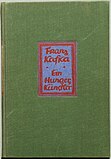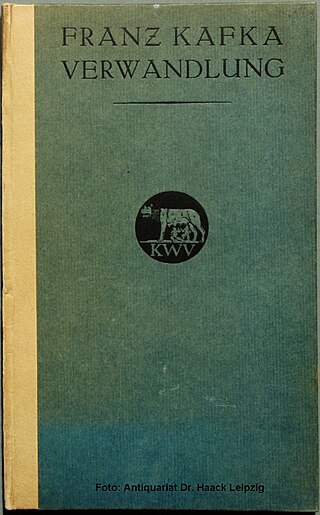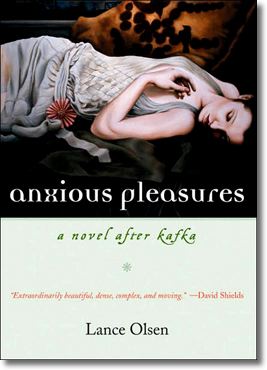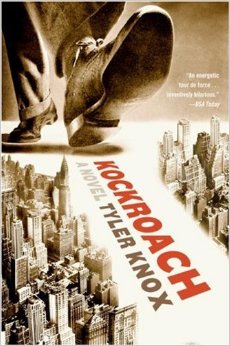| English title | Original German title | Collected in: |
|---|
| "Shamefaced Lanky and Impure in Heart" | "Der Unredliche in seinem Herzen" (1958, written 1902) | Letters to Friends, Family, and Editors |
"Description of a Struggle"
includes two dialogues originally published separately:
"Conversation with the Supplicant"
"Conversation with the Drunk" | "Beschreibung eines Kampfes" (1909)
"Gespräch mit dem Beter"
"Gespräch mit dem Betrunkenen" | Description of a Struggle ,
The Complete Stories ;
Both dialogues originally published in Hyperion (Munich, 1909);
a different version of "Conversation with the Supplicant"
appears in The Penal Colony: Stories and Short Pieces |
| "Wedding Preparations in the Country" | "Hochzeitsvorbereitungen auf dem Lande" (1954, written 1907-1908) | The Complete Stories,
Dearest Father. Stories and Other Writings |
| "The Judgment" | "Das Urteil" (1913) | The Complete Stories,
The Sons ,
The Penal Colony: Stories and Short Pieces |
The Metamorphosis
or The Transformation | Die Verwandlung (1915) | The Complete Stories,
The Sons,
The Penal Colony: Stories and Short Pieces |
| "The Stoker" | "Der Heizer" (1913) | The Sons;
first chapter of Amerika |
| "In the Penal Colony" | "In der Strafkolonie" (1919) | The Complete Stories,
The Penal Colony: Stories and Short Pieces |
| "The Village Schoolmaster (The Giant Mole)" | "Der Dorfschullehrer"
or Der Riesenmaulwurf (1931, written 1915) | The Complete Stories,
The Great Wall of China |
| "Blumfeld, an Elderly Bachelor" | "Blumfeld, ein älterer Junggeselle" (1936, written 1913) | Description of a Struggle,
The Complete Stories |
| The Warden of the Tomb (short play) | Der Gruftwächter (written 1916-17) | Description of a Struggle,
The Complete Stories |
| "The Hunter Gracchus" | "Der Jäger Gracchus" (1931, written 1917) | The Complete Stories,
Parables and Paradoxes ,
The Great Wall of China |
| "The Great Wall of China" | "Beim Bau der Chinesischen Mauer" (1931, written 1917) | The Complete Stories,
The Great Wall of China |
| "The Refusal" | "Die Abweisung" (written 1920) | Description of a Struggle,
The Complete Stories,
Parables and Paradoxes |
| "A Hunger Artist" | "Ein Hungerkünstler" (1922) | The Complete Stories,
The Penal Colony: Stories and Short Pieces |  |
| "Investigations of a Dog" | "Forschungen eines Hundes" (written 1922) | The Complete Stories,
The Great Wall of China |
| "A Little Woman" | "Eine kleine Frau" (1924) | The Complete Stories,
The Penal Colony: Stories and Short Pieces |
| "The Burrow" | "Der Bau" (1931) | The Complete Stories,
The Great Wall of China |
"Josephine the Singer,
or The Mouse Folk" | "Josefine, die Sängerin oder Das Volk der Mäuse" (1924) | The Complete Stories,
The Penal Colony: Stories and Short Pieces |
| "The Bridge" | "Die Brücke" | The Complete Stories,
The Great Wall of China |
| "The Bucket Rider" | "Der Kübelreiter" (1921, written 1917) | The Complete Stories,
The Penal Colony: Stories and Short Pieces,
The Great Wall of China |
| "The Knock at the Manor Gate" | "Der Schlag ans Hoftor" | The Complete Stories,
The Great Wall of China |
| "My Neighbor" | "Der Nachbar" (written 1917) | The Complete Stories,
The Great Wall of China |
| "A Crossbreed" | "Eine Kreuzung" | The Complete Stories,
The Great Wall of China |
| "A Common Confusion" | "Eine alltägliche Verwirrung" | The Complete Stories,
The Great Wall of China |
| "The Truth about Sancho Panza" | "Die Wahrheit über Sancho Pansa" | The Complete Stories,
Parables and Paradoxes,
The Great Wall of China |
| "The Silence of the Sirens" | "Das Schweigen der Sirenen" | The Complete Stories,
Parables and Paradoxes,
The Great Wall of China |
| "Prometheus" | "Prometheus" (written 1917-23) | The Complete Stories,
Parables and Paradoxes,
The Great Wall of China |
| "The City Coat of Arms" | "Das Stadtwappen" | The Complete Stories,
Parables and Paradoxes,
The Great Wall of China |
| "Poseidon" | "Poseidon" (written 1920) | Description of a Struggle ,
The Complete Stories,
Parables and Paradoxes |
| "Fellowship" | "Gemeinschaft" | Description of a Struggle,
The Complete Stories |
| "At Night" | "Nachts" | Description of a Struggle,
The Complete Stories |
| "The Problem of Our Laws" | "Zur Frage der Gesetze" | The Complete Stories,
Parables and Paradoxes,
The Great Wall of China |
| "The Conscription of Troops" | "Die Truppenaushebung" | Description of a Struggle,
The Complete Stories |
| "The Test" | "Die Prüfung" | Description of a Struggle,
The Complete Stories,
Parables and Paradoxes |
| "The Vulture" | "Der Geier" | Description of a Struggle,
The Complete Stories,
Parables and Paradoxes |
| "The Helmsman" | "Der Steuermann" | Description of a Struggle,
The Complete Stories |
| "The Top" | "Der Kreisel" | Description of a Struggle,
The Complete Stories |
| A Little Fable | "Kleine Fabel" | The Complete Stories,
The Great Wall of China |
| Home-Coming | "Heimkehr" | Description of a Struggle,
The Complete Stories |
| First Sorrow | "Erstes Leid" (written 1921-22) | The Complete Stories,
The Penal Colony: Stories and Short Pieces |
| "The Departure" | "Der Aufbruch" (written 1920-21) | Description of a Struggle,
The Complete Stories |
| "Advocates" | "Fürsprecher" (written 1922) | Description of a Struggle,
The Complete Stories |
| "The Married Couple" | "Das Ehepaar" (written 1922) | The Complete Stories,
The Great Wall of China |
| "Give It Up!" | "Gibs auf!" | Description of a Struggle,
The Complete Stories |
| "On Parables" | "Von den Gleichnissen" | The Complete Stories,
Parables and Paradoxes,
The Great Wall of China |
| "Peking and the Emperor" | "Der Kaiser von Peking" | Parables and Paradoxes |
"The Great Wall
and the Tower of Babel" | "Die Chinesische Mauer
und der Turmbau von Babel" | Parables and Paradoxes |
| "Paradise" | "Das Paradies" | Parables and Paradoxes |
| "The Tower of Babel" | "Der Turm zu Babel" | Parables and Paradoxes |
| "The Pit of Babel" | "Der Schacht von Babel" | Parables and Paradoxes |
| "Abraham" | "Abraham" | Parables and Paradoxes |
| "Mount Sinai" | "Der Berg Sinai" | Parables and Paradoxes |
| "The Building of the Temple" | "Der Tempelbau" | Parables and Paradoxes |
| "The Animal in the Synagogue" | "Das Tier in der Synagoge" | Parables and Paradoxes |
| "The Watchman" | "Der Wächter" | Parables and Paradoxes |
| "The Coming of the Messiah" | "Das Kommen des Messias" | Parables and Paradoxes |
| "The Sirens" | "Die Sirenen" | Parables and Paradoxes |
| "Leopards in the Temple" | "Leoparden in Tempel" | Parables and Paradoxes |
| "Alexander the Great" | "Alexander der Grosse" | Parables and Paradoxes |
| "Diogenes" | "Diogenes" | Parables and Paradoxes |
| "The Building of a City" | "Der Bau einer Stadt" | Parables and Paradoxes |
| "The Imperial Colonel" | "Der Kaiserliche Oberst" | Parables and Paradoxes |
| "The Emperor" | "Der Kaiser" | Parables and Paradoxes |
| "In the Caravansary" | "In der Karawanserei" | Parables and Paradoxes |
| "The Cell" | "Die Zelle" | Parables and Paradoxes |
| "The Invention of the Devil" | "Die Erfindung des Teufels" | Parables and Paradoxes |
| "The Savages" | "Die Wilden" | Parables and Paradoxes |
| "The Green Dragon" | "Der Grüne Drache" | Parables and Paradoxes |
| "The Tiger" | "Der Tiger" | Parables and Paradoxes |
| "Couriers" | "Kuriere" | Parables and Paradoxes |
| "A Chinese Puzzle" | "Ein Geduldspiel" | Parables and Paradoxes |
| "Robinson Crusoe" | "Robinson Crusoe" | Parables and Paradoxes |
| "The Spring" | "Die Quelle" | Parables and Paradoxes |
| "The Hunger Strike" | "Die Unersättlichsten" | Parables and Paradoxes |
| "My Destination" | "Das Ziel" | Parables and Paradoxes |























